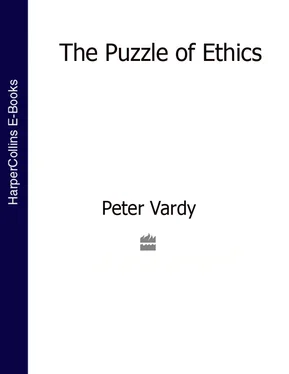In this book the field of ethics will be taken to cover not just those actions which are right or wrong but will also explore the fundamental principles which lie behind these actions. In addition, at least at times, the issue of virtue that so preoccupied Aristotle and many of his successors will be considered. We shall see, however, that Aristotle’s approach has been subject to considerable criticism.
Ethical judgements underpin our society and hard choices face us in the years ahead as we attempt to decide
who will have medical treatment and who will not;
What rights a person has to restrict access to their genetic information;
Whether genetically engineered crops are ethically justifiable;
Whether ‘living wills’ by patients who are terminally ill and in great pain can justify bringing their lives to an end;
How and for what reasons criminals should be punished;
Whether the powers of the media should be controlled;
Whether animals have rights.
These and many similar issues will not go away and they need to be confronted and thought through. The aim of this book is to help you in this task.
TWO
Plato – Virtue and Knowledge
Plato was born in 427 B.C. and was a pupil of Socrates. In 367 B.C. he was invited to take charge of the education of the young ruler of Syracuse – Dionysius II – who controlled the most powerful state in Sicily. The experiment failed, although perhaps more due to Dionysius’ personality than to defects in Plato’s philosophy. However his legacy lives on and he has had the most profound influence on subsequent philosophy.
Plato takes a more systematic approach than Socrates – Socrates’ questioning method was aimed at showing those he talked to that their supposed knowledge was, in fact, shallow and vulnerable. Socrates certainly had positive views to which he tried to direct people, although he may have lacked the philosophic backing for them for which Plato argued. When the Delphi oracle proclaimed Socrates the wisest man in Athens, he came to think (after questioning many people who thought themselves wise but who, by their answers, quickly showed that they were not) that this was because he knew that he knew nothing and that ‘that man was wisest who knew that he knew little’. We do not know how much of the discussions attributed to Socrates actually came from Socrates himself and to what extent Plato was using Socrates as a vehicle for his own ideas, however Plato’s approach to morality certainly owes much, as we shall see, to his theory of knowledge.
i) The Euthyphro dilemma
In Plato’s book Euthyphro , a discussion occurs between Socrates and a young man, Euthyphro, who intends to prosecute his own father because his father tied up a peasant who was involved in a dunken brawl, intending to report him to the authorities. However, the father forgot about him and the peasant died. Euthyphro is horrified and instead of dining with his father, sets out to prosecute him. The discussion centres on whether what human beings are morally obliged to do rests on what the gods command or whether the gods only command what is good independent of their commanding it. There are problems whichever route is taken:
1 If one sides with Euthyphro and claims that whatever the gods command is obligatory just because they command it, then the commands of the gods (or God) are clearly absolute. The problem with this is that whatever God commands is good just because God commands it. God could then command vicious actions which would appear to us to be wrong (such as in the O.T. when God is recorded as commanding the slaughter of women and children) and we would have to call these good just because they are commanded by God. God then becomes a supreme power figure who has to be worshipped and obeyed whatever God may command.
2 If one sides with Socrates and claims that there is a standard of goodness independent of God, then God is no longer the ultimate standard of morality. Plato and Socrates’ views are the same here – Plato considered that the Forms (p. 11) provide the absolute standard of goodness and, therefore, the commands of the gods can be measured against this standard. This is attractive as it provides a reason for worshipping the gods or God (God is worshipped because God is good judged by this independent standard) but the problem is that God is no longer supreme – there is an independent standard against which God can be measured, namely the Form of the Good.
Euthyphro is effectively arguing, against Socrates, for a Divine Command theory of ethics – in other words he is taking the view that morality is based on what God commands or on what God wills. Paul Helm in the introduction to Divine Commands and Morality claims that the Divine Command Theory holds that ‘God does issue commands and that these commands are to form the basis of a believer’s morality’. Theologians such as Duns Scotus and William of Ockham have supported Divine Command theories of Ethics – effectively maintaining that if God commanded adultery or theft then these would then become good actions. Others have rejected this approach. Alasdair MacIntyre is a good example:
… We ought to do what God commands, if we are theists, because it is right in some independent sense of ‘right’, rather than hold what God commands is right just because God commands it, a view which depends on ‘right’ being defined as ‘being in accordance with what God commands’.
( The Religious Significance of Atheism , p. 33)
One can attempt to get round the problems on the first horn of the Euthyphro dilemma by saying what is good is in accordance with the commands of a loving God. This would then appear to rule out some of the more objectionable commands in the Old Testatment as these could not, apparently, be commanded by a loving God. However this does not solve the problem as it is then necessary to determine what it means to be loving. This is far from clear, after all even loving human parents sometimes have to hurt their children (for instance by giving inoculations). The problem thus arises as to whether what is loving depends on God’s will or whether there is an independent standard of what it is to be loving – in other words the problem of the Euthyphro dilemma in relation to goodness is simply raised a level and arises again about the nature of love.
Plato opts for a standard of morality independent of God – and this he finds in the Forms (see p. 11). Plato was a realist as he held that moral statements were true or false in so far as they corresponded to an absolute moral order. His view can be rejected by maintaining that there is no absolute standard of morality – instead morality is relative. However, if one does not wish to take this approach, if one holds that there is an absolute standard of right and wrong and yet is unwilling to ascribe this standard to God, then Plato’s approach must still be taken seriously. Iris Murdoch (in The Sovereignty of the Good ) and Stephen Clark (in The Parliament of Souls ) are two modern philosophers who take a Platonic approach.
In the Theatetus , Plato sets out an alternative position which he then argues against – the position is set out by Protagoras who argues that all knowledge is relative to the individual and all morality is similarly relative. If this position is accepted, then neither horn of the Euthyphro dilemma is valid – there is no absolute standard of morality at all. Protagoras’ most quoted saying is that:
An individual human being is the measure of all things.
This used to be phrased ‘man is the measure of all things’, but the above is preferable today and is, in any case, probably a better translation. Plato sees this as referring to those things which human beings experience. Effectively Plato takes Protagoras to be arguing that things are as they seem to us that they are. There is no such thing as ‘being cold’ or ‘being hot’ independent of their relation to the observer, rather hotness and coldness are relative to the person who feels that the thing is hot or cold. ‘Really cold’ just means ‘cold for some person x’. There is no absolute standard of ‘coldness’ independent of the relation. Imagine two people – a young man and a young woman. The man says:
Читать дальше












